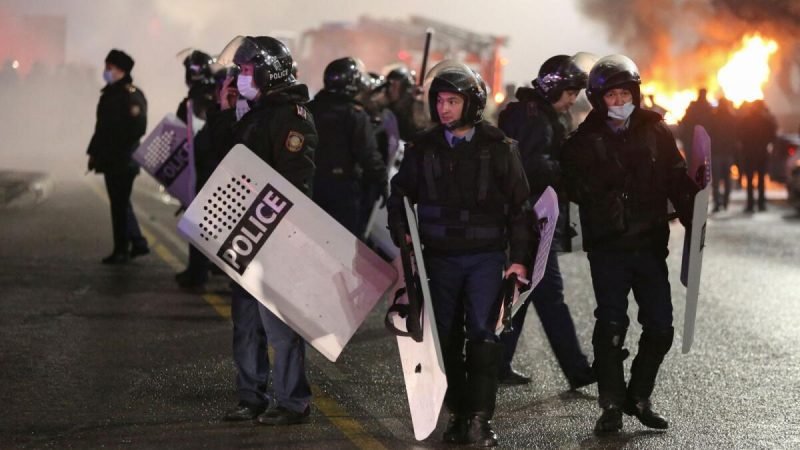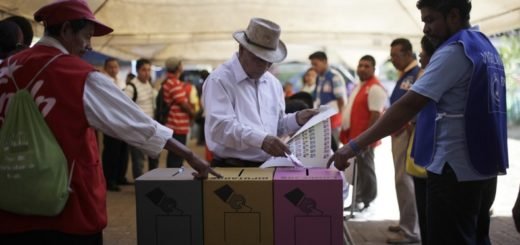Kazakhstan fuel protest: cry for a bigger change

From the beginning of this year Kazakhstan has descended into a very chaotic state of affairs that was rekindled due to the sudden increase in fuel price to 120 Tenge (from 60 Tenge). Protests soon engulfed the whole country and took a rather dubious turn when violence ensued. Approximately 164 deaths including civilians and police personnel were reported, nearly 6000 people were detained, property damage of 175 million euros and more than 100 businesses and banks were wrecked and plundered. These protests are not solely a result of the increase of fuel prices but also because of the incessant authoritarian rule that the country has faced since its independence. Neighboring countries and military alliances have lent helping hands to bring the situation under control, as the whole country started slipping into anarchy.
History of Kazakhstan’s authoritarianism
In 1990, Kazakhstan broke away from the former Soviet Union and gained independence. Nursultan Nazarbayev became the first President of independent Kazakhstan and ruled it from 1990 to 2019. The growing corruption, nepotism and the influence of the few powerful people from the former Soviet-Union were still largely prevalent in the society. The supposed democracy in Kazakhstan was one in name only, all the elections were reported to be rigged and unfair, the rule by Nazarbayev was thus largely being recognized as an authoritarian one. The very core problem of the current protests stems in these very issues, people were fed-up at plummeting inequality that existed in the society and all this was ultimately pushed over the edge by the irrational move of the present government to increase the fuel prices.
The current President of Kazakhstan Kassym-Jomart Tokayev assumed charge in 2019, the election was condemned by many international analysts on the grounds that it wasn’t democratic enough, reckoning the fact that Tokayev was supposedly a hand-picked successor by the former president Nazarbayev, despite winning by a landslide victory. But the fact that Nazarbayev still enjoyed considerable power in the newly elected government was reaffirming about the alleged malfunctioning of democracy, which included being the Chairman of the Security Council of Kazakhstan, which he had to forfeit after the protests arose. The protestors chanted “old man go away”, signaling their grievances towards the former President’s control.
Dichotomy of the Land
Kazakhstan, the world’s largest landlocked country, is blessed with enormous natural resources and ranks 12th in the global ranking for Oil Reserves, which is 3% of the world’s total oil reserve (Worldometers , n.d.). Despite the availability of such resources, Kazakhstan is not doing well economically, the inequality and there is an increasingly widening gulf between the haves and have-nots. According to KPMG, only 162 people in Kazakhstan hold 55% of the wealth in the country (Kantchev, 2022). Any oil-producing country is often considered wealthy but in case of Kazakhstan it resulted in a class of rich and affluent people. This disparity is the major driving force of the corruption that has crept its way into the country’s core (Kazakhstan ranked 94th on the Corruption Perception Index), which is also one of the main reasons for the current upheaval. The government has developed a habit of covering up all the criticisms by funding positive media, masquerading its diabolical motives.

The protests may seem unforeseen but the seeds were long buried in the very political system of the country which was pregnant with false pretense. The government immediately struck back with double barbarity, the internet was shut down and reports of brutality by security forces to suppress the protesters caused a huge ruckus worldwide, a state of emergency was thus declared in major cities of Mangistau and Almaty. Eventually major riots broke out throughout the country. The cabinet under Prime Minister Askar Mamin was forced to resign followed by the announcement by President Tokayev to cap fuel prices at 50 tenge for 6 months, he even went on to declare that the protestors were “bandits and terrorists” and claimed that they were “attempted coup d’état”, he went on to say that he wouldn’t shy away from using force against them.
Reaction and impact on other states
The current protests did most definitely affect Kazakhstan’s economy and cause great social unrest, but it has more gravely cut a wound open for all the authoritarian countries that calls for a domino effect. The way that Arab spring of 2011 started in Tunisia and eventually spread to all Arab countries or the way Communism spread in Eastern Europe during the early 1900s is a good example of what this protest could unfurl. The state of affairs in Central Asia is already fragile with the recent Taliban takeover of Afghanistan, which is why this crisis that basically emerged from increase in fuel prices could fiddle with the overall momentary peace of the whole region.
Russia is one the major benefactor of Kazakhstan and has huge influence on all the political, social and economic spheres. Kazakhstan sought help from Russia, which deployed its peacekeeping forces through Collective Security Treaty Organization, that is a combined venture of former Soviet-union countries. Russia has helped secure various places including the airports and other public places as well. On the other hand, China is also trying to play an active role in region considering the fact that Kazakhstan is one of the major counties that is a part of its Belt and Road Initiative (BRI). China earlier decided to not interfere in this issue, brushing it off as an internal affair of Kazakhstan, but after finding out the agile role played by Russia, China was forced to pursue its ulterior motives. China offered economic aid to the Kazakh government through Shanghai Cooperation Organization (SCO). Thus, an internal chaos is unfolding to be a battlefield between China and Russia.
US being an active critique of authoritarianism had to face a backlash due to the protests, as Kazakhstan is a major country for USA’s energy resources, many US companies like Chevron and Exxon Mobil have tones of investments here. Other countries like UK, France, India, etc., have condemned the violence.
Future implications
Kazakhstan holds a very vital position in today’s contemporary geopolitics, not only because of the huge amount of oil reserves but also because unrest in such a decisive part of Asia could trigger a chain of violence in neighboring countries. Kazakhstan also is the second most important place for crypto mining locations after China has banned all crypto-mining. The recent internet shutdown has negatively affected the process of crypto-mining by increasing the computational power (energy) to mine cryptocurrency. This whole process further faces a period of uncertainty following up the chaos that still upholds.
The damage to business, life, society and foreign affairs that too amidst the pandemic has accentuated the visible cracks that are still omnipresent in Kazakhstan’s political system. The protests have certainly showed people’s yearning for a revolution that would reshape the system as a whole.
References
Kantchev, G. (2022). Wall Street Journal . Retrieved from https://www.wsj.com/articles/kazakhstans-elite-got-richer-on-natural-resources-then-came-the-unrest-11641572839
Worldometers . (n.d.). Retrieved from https://www.worldometers.info/oil/kazakhstan-oil/


















